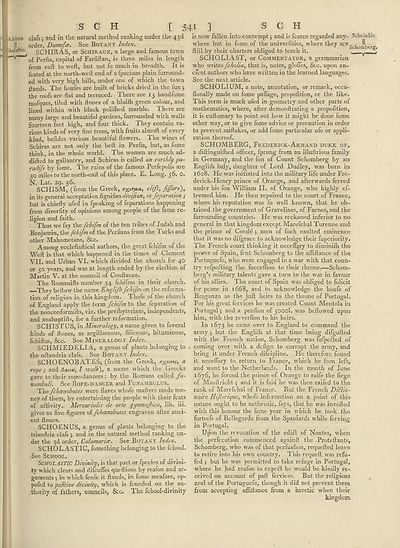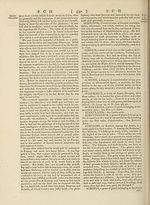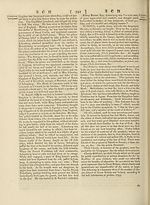Encyclopaedia Britannica, or, a Dictionary of arts, sciences, and miscellaneous literature : enlarged and improved. Illustrated with nearly six hundred engravings > Volume 18, RHI-SCR
(563) Page 541
Download files
Complete book:
Individual page:
Thumbnail gallery: Grid view | List view

S C H [ 541 ] S C H
Lhinus clafs; and in the natural method ranking under the 43d
II . order, Dumofce. See Botany Index.
i holaftic. gCHIRAS, or Schirauz, a large- and famous town
^ ' ^f Perfia, capital of Farfiftan, is three miles in length
from eaft to weft, but not fo much in breadth. It is
feated at the north-weft end of a fpacious plain furround-
ed with very high hills, under one of which the town
ftands. The Houfes are built of bricks dried in the fun ;
the roofs are flat and terraced. There are 15 handfome
mofques, tiled with ftones of a bluilh green colour, and
lined within with black poliftied marble. There are
many large and beautiful gardens, furrounded with walls
fourteen feet high, and four thick. They contain va¬
rious kinds of very fine trees, with fruits almoft of every
kind, befides various beautiful flowers. The wines of
Schiras are not only the beft in Perfia, but, as fome
think, in the whole world. The women are much ad-
di&ed to gallantry, and Schiras is called an earthly pa-
radife by fome. The ruins of the famous Perfepolis are
30 miles to the north-eaft of this place. E. Long. 56. O.
N. Lat. 29. 36.
SCHISM, (from the Greek, <r%Krpcc, clift, fijfure),
in its general acceptation fignifies divijion^ or feparation ;
but is chiefly ufed in fpeaking of feparations happening
from diverfity of opinions among people of the fame re¬
ligion and faith.
Thus we fay the fchifm of the ten tribes of Judah and
Benjamin, the fchifm of the Perfians from the Turks and
other Mahometans, &c.
Among ecclefiaftical authors, the great fchifm of the
Wert is that which happened in the times of Clement
VII. and Urban VI. which divided the church for 40
or 50 years, and was at length ended by the election of
Martin V. at the council of Conftance.
The Romanifts number 34 fchifms in their church.
They beftow the name Englijhfchifm on the reforma¬
tion of religion in this kingdom. I hofe of the church
of England apply the term fchifm to the feparation of
the nonconformifts, viz. the prefbyterians, independents,
and anabaptifts, for a further reformation.
SCHIST US, in Mineralogy, a name given to feveral
kinds of ftones, as argillaceous, filiceous, bituminous,
fchiftus, &c. See Mineralogy Index.
SCHMIEDELIA, a genus of plants belonging to
the o6tandria clafs. See Botany Index.
SCHOENOBATESj (from the Greek, a
rope ; and (Zxiva, I walk), a name which the Greeks
gave to their rope-dancers : by the Romans called fu-
nambuli. See Rope-dancer and Funambulus.
The fchoenobates were flaves whofe matters made mo¬
ney of them, by entertaining the people with their feats
of activity.. Mercurialis de arte gymnafica, lib. in.
gives us five figures of fcluznobates engraven after anci¬
ent ftones.
SCHOENUS, a genus of plants belonging to the
triandria clafs •, and in the natural method ranking un¬
der the 3d order, Calamariee. See Botany Index.
SCHOLASTIC, fomething belonging to the fehool.
See School.
Scholastic Divinity, is that part or fpecies of divini¬
ty which clears and difeufles qiieftions by realon and ar¬
guments; in which fenfe it ftands, in fome meafure, op-
pofed pofitive divinity, which is founded on the au¬
thority of fathers, councils, &c. The fchocl-divinity
is now fallen into contempt; and is fcarce regarded any- Scholaftic
where but in fome of the univerfities, where they are , M
ftill by their charters obliged to teach it. c om erg.
SCHOLIAST, or Commentator, a grammarian
who writes fcholia, that is, notes, glofies, &c. upon an¬
cient authors who have written in the learned languages.
See the next article.
SCHOLIUM, a note, annotation, or remark, occa-
fionally made on fome paflage, propofition, or the like.
This term is much ufed in geometry and other parts of
mathematics, where, after demonftrating a propofition,
it is cuftomary to point out how it might be done fome
other way, or to give fome advice or precaution in order
to prevent miftakes, or add fome particular ufe or appli¬
cation thereof.
SCHOMBERG, Frederick-Armand duke of,
a diftinguifhed officer, fprung from an illuftrious family
in Germany, and the fon of Count Schomberg by an
Engliffi lady, daughter of Lord Dudley, was born in
1608. He was initiated into the military life under Fre-
derick-Henry prince of Orange, and afterwards ferved
under his fon William II. of Orange, who highly ef-
teemed him. He then repaired to the court of France,
where his reputation was lb well known, that he ob¬
tained the government of Gravelines, of Furnes, and the
furrounding countries. He was reckoned inferior to no
general in that kingdom except Marefchal Turenne and
the prince of Conde ; men of fuch exalted eminence
that it was no difgrace to acknowledge their fuperiority.
The French court thinking it neceflary to diminifh the
power of Spain, fent Schomberg to the affiftance of the
Fortuguefe, who were engaged in a war with that coun¬
try refpe&ing the fucceffion to their throne.—Schom-
berg’s military talents gave a turn to the war in favour
of his allies. The court of Spain was obliged to folicit
for peace in 1668, and to acknowledge the houfe of
Braganza as the juft heirs to the throne of Portugal.
For his great fervices he was created Count Mentola in
Portugal; and a penfion of 5000I. wTas bellowed upon
him, with the reverfion to his heirs.
In 1673 he came over to England to command the
army ; but the Englifti at that time being difgufted
with the French nation, Schomberg was fufpefted of
coming over with a defign to corrupt the army, and
bring it under French difeipline. He therefore found
it neceffary to return to France, which he foon left,
and went to the Netherlands. In the month of June
1676, he forced the prince of Orange to raife the liege
of Maeftricht ; and it is faid he was then railed to the
rank of Marefchal of France. But the French DiElio-
naire Hiforique, whofe information on a point of this
nature ought to be authentic, fays, that he was invefted
with this honour the fame year in which he took the
fortrefs of Bellegarde from the Spaniards while ferving
in Portugal.
Upon the revocation of the edi£l of Nantes, when
the perfecution commenced againlt the Proteftants,
Schomberg, who was of that perfuafion, requefted leave
to retire into his own country. This requeft was refu-
fed ; but he was permitted to take refuge in Portugal,
where he had reafon to expect be would be kindly re¬
ceived on account of pall fervices. But the religious
zeal of the Portuguefe, though it did not prevent them
from accepting affiftance from a heretic when their
kingdom
Lhinus clafs; and in the natural method ranking under the 43d
II . order, Dumofce. See Botany Index.
i holaftic. gCHIRAS, or Schirauz, a large- and famous town
^ ' ^f Perfia, capital of Farfiftan, is three miles in length
from eaft to weft, but not fo much in breadth. It is
feated at the north-weft end of a fpacious plain furround-
ed with very high hills, under one of which the town
ftands. The Houfes are built of bricks dried in the fun ;
the roofs are flat and terraced. There are 15 handfome
mofques, tiled with ftones of a bluilh green colour, and
lined within with black poliftied marble. There are
many large and beautiful gardens, furrounded with walls
fourteen feet high, and four thick. They contain va¬
rious kinds of very fine trees, with fruits almoft of every
kind, befides various beautiful flowers. The wines of
Schiras are not only the beft in Perfia, but, as fome
think, in the whole world. The women are much ad-
di&ed to gallantry, and Schiras is called an earthly pa-
radife by fome. The ruins of the famous Perfepolis are
30 miles to the north-eaft of this place. E. Long. 56. O.
N. Lat. 29. 36.
SCHISM, (from the Greek, <r%Krpcc, clift, fijfure),
in its general acceptation fignifies divijion^ or feparation ;
but is chiefly ufed in fpeaking of feparations happening
from diverfity of opinions among people of the fame re¬
ligion and faith.
Thus we fay the fchifm of the ten tribes of Judah and
Benjamin, the fchifm of the Perfians from the Turks and
other Mahometans, &c.
Among ecclefiaftical authors, the great fchifm of the
Wert is that which happened in the times of Clement
VII. and Urban VI. which divided the church for 40
or 50 years, and was at length ended by the election of
Martin V. at the council of Conftance.
The Romanifts number 34 fchifms in their church.
They beftow the name Englijhfchifm on the reforma¬
tion of religion in this kingdom. I hofe of the church
of England apply the term fchifm to the feparation of
the nonconformifts, viz. the prefbyterians, independents,
and anabaptifts, for a further reformation.
SCHIST US, in Mineralogy, a name given to feveral
kinds of ftones, as argillaceous, filiceous, bituminous,
fchiftus, &c. See Mineralogy Index.
SCHMIEDELIA, a genus of plants belonging to
the o6tandria clafs. See Botany Index.
SCHOENOBATESj (from the Greek, a
rope ; and (Zxiva, I walk), a name which the Greeks
gave to their rope-dancers : by the Romans called fu-
nambuli. See Rope-dancer and Funambulus.
The fchoenobates were flaves whofe matters made mo¬
ney of them, by entertaining the people with their feats
of activity.. Mercurialis de arte gymnafica, lib. in.
gives us five figures of fcluznobates engraven after anci¬
ent ftones.
SCHOENUS, a genus of plants belonging to the
triandria clafs •, and in the natural method ranking un¬
der the 3d order, Calamariee. See Botany Index.
SCHOLASTIC, fomething belonging to the fehool.
See School.
Scholastic Divinity, is that part or fpecies of divini¬
ty which clears and difeufles qiieftions by realon and ar¬
guments; in which fenfe it ftands, in fome meafure, op-
pofed pofitive divinity, which is founded on the au¬
thority of fathers, councils, &c. The fchocl-divinity
is now fallen into contempt; and is fcarce regarded any- Scholaftic
where but in fome of the univerfities, where they are , M
ftill by their charters obliged to teach it. c om erg.
SCHOLIAST, or Commentator, a grammarian
who writes fcholia, that is, notes, glofies, &c. upon an¬
cient authors who have written in the learned languages.
See the next article.
SCHOLIUM, a note, annotation, or remark, occa-
fionally made on fome paflage, propofition, or the like.
This term is much ufed in geometry and other parts of
mathematics, where, after demonftrating a propofition,
it is cuftomary to point out how it might be done fome
other way, or to give fome advice or precaution in order
to prevent miftakes, or add fome particular ufe or appli¬
cation thereof.
SCHOMBERG, Frederick-Armand duke of,
a diftinguifhed officer, fprung from an illuftrious family
in Germany, and the fon of Count Schomberg by an
Engliffi lady, daughter of Lord Dudley, was born in
1608. He was initiated into the military life under Fre-
derick-Henry prince of Orange, and afterwards ferved
under his fon William II. of Orange, who highly ef-
teemed him. He then repaired to the court of France,
where his reputation was lb well known, that he ob¬
tained the government of Gravelines, of Furnes, and the
furrounding countries. He was reckoned inferior to no
general in that kingdom except Marefchal Turenne and
the prince of Conde ; men of fuch exalted eminence
that it was no difgrace to acknowledge their fuperiority.
The French court thinking it neceflary to diminifh the
power of Spain, fent Schomberg to the affiftance of the
Fortuguefe, who were engaged in a war with that coun¬
try refpe&ing the fucceffion to their throne.—Schom-
berg’s military talents gave a turn to the war in favour
of his allies. The court of Spain was obliged to folicit
for peace in 1668, and to acknowledge the houfe of
Braganza as the juft heirs to the throne of Portugal.
For his great fervices he was created Count Mentola in
Portugal; and a penfion of 5000I. wTas bellowed upon
him, with the reverfion to his heirs.
In 1673 he came over to England to command the
army ; but the Englifti at that time being difgufted
with the French nation, Schomberg was fufpefted of
coming over with a defign to corrupt the army, and
bring it under French difeipline. He therefore found
it neceffary to return to France, which he foon left,
and went to the Netherlands. In the month of June
1676, he forced the prince of Orange to raife the liege
of Maeftricht ; and it is faid he was then railed to the
rank of Marefchal of France. But the French DiElio-
naire Hiforique, whofe information on a point of this
nature ought to be authentic, fays, that he was invefted
with this honour the fame year in which he took the
fortrefs of Bellegarde from the Spaniards while ferving
in Portugal.
Upon the revocation of the edi£l of Nantes, when
the perfecution commenced againlt the Proteftants,
Schomberg, who was of that perfuafion, requefted leave
to retire into his own country. This requeft was refu-
fed ; but he was permitted to take refuge in Portugal,
where he had reafon to expect be would be kindly re¬
ceived on account of pall fervices. But the religious
zeal of the Portuguefe, though it did not prevent them
from accepting affiftance from a heretic when their
kingdom
Set display mode to:
![]() Universal Viewer |
Universal Viewer | ![]() Mirador |
Large image | Transcription
Mirador |
Large image | Transcription
Images and transcriptions on this page, including medium image downloads, may be used under the Creative Commons Attribution 4.0 International Licence unless otherwise stated. ![]()
| Permanent URL | https://digital.nls.uk/193026026 |
|---|
| Attribution and copyright: |
|
|---|
| Description | Ten editions of 'Encyclopaedia Britannica', issued from 1768-1903, in 231 volumes. Originally issued in 100 weekly parts (3 volumes) between 1768 and 1771 by publishers: Colin Macfarquhar and Andrew Bell (Edinburgh); editor: William Smellie: engraver: Andrew Bell. Expanded editions in the 19th century featured more volumes and contributions from leading experts in their fields. Managed and published in Edinburgh up to the 9th edition (25 volumes, from 1875-1889); the 10th edition (1902-1903) re-issued the 9th edition, with 11 supplementary volumes. |
|---|---|
| Additional NLS resources: |
|

